Since Friday, former President Álvaro Uribe Vélez, the most influential politician in the country in the last 25 years, has been awaiting the issuance of an arrest warrant so he can serve the 12-year sentence imposed by Judge Sandra Heredia for two crimes: procedural fraud and witness bribery, at his home in Llanogrande, Antioquia.
The so-called ‘case of the century’ was closed with a 1,114-page ruling in which Judge 44 of the Bogotá Circuit found it proven, in essence, that the former president was the “determiner” of what she considered an elaborate “fable” aimed at changing versions against him and his brother Santiago, given by former paramilitaries, and to smear one of his political and ideological nemeses: Senator Iván Cepeda Castro of the Historic Pact.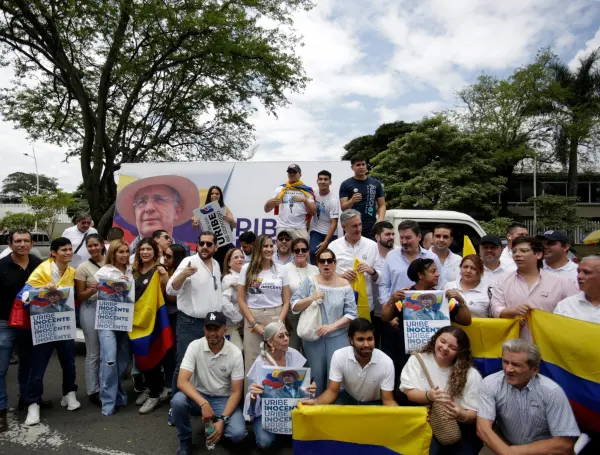
“Behaviors of which there is no doubt that they were committed by several lawyers, individuals (and) prisoners, who joined the criminal design, actively contributing with concrete acts that facilitated the execution of the punishable conduct in which Diego Javier Cadena Ramírez is located, who true to his name was dedicated to linking people, actions and crimes, forging a criminal network where each link had an assigned purpose (...) Of course, with an unwavering motto, to protect the identity of the true instigator, moved not only by fear, but by a devotional loyalty that led them to protect the mastermind of the criminal plan, even at the cost of their own criminal responsibility."
These are some of the terms contained in Judge Heredia's decision, which have led to talk from various quarters, starting with the former president himself, of an alleged imposition of politics over legality in the sentencing."Here, politics has prevailed over law. This is not an independent ruling, but one driven by political influences driven by the official interest in silencing an opposition leader," Uribe said on Friday, at the hearing where he was officially notified of the 12-year sentence.
The Criminal Chamber of the Bogotá Court, made up of three judges, will be the next stop in a process that began in 2012 due to complaints from Uribe against Cepeda for alleged purchase of witnesses and that took a 180-degree turn in 2018, when the Supreme Court closed the case against the accused and found grounds to investigate the accuser.
Disputed figures such as Juan Guillermo Monsalve (a former AUC member considered the"star witness" against the Uribes) and lawyer Diego Cadena (who, according to the ruling, was the former president's instrument in offering perks to Monsalve and other former paramilitaries) are protagonists of the process that is shaking the legal and political world in Colombia and was followed by millions of people through live broadcasts.
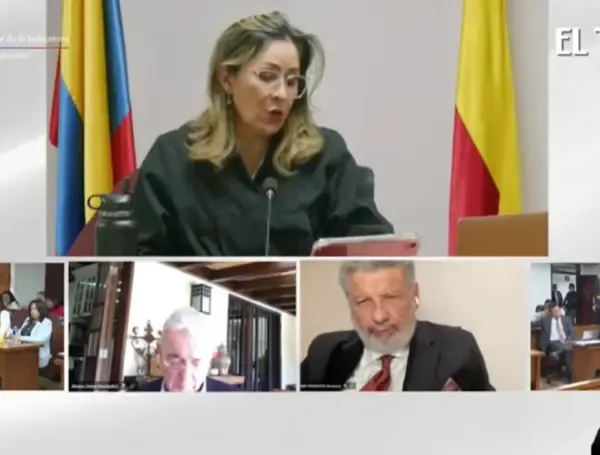
Since Monday, July 28, the day the condemnatory ruling was announced, the debate over the evidence Judge Heredia decided to support her decision has intensified. That debate escalated on Friday, due to the high level of the sentence, which even exceeded the nine years requested by the Prosecutor's Office, by three years, and, especially, due to the"rapid" arrest warrant issued by Judge Heredia.
In its ruling, it states that “immediate deprivation of liberty is necessary to ensure the preservation of peaceful and harmonious coexistence among citizens (...) This measure not only has a deterrent and intimidating effect that prevents the commission of crimes, but also avoids the negative perception in society that people can continue to enjoy their freedom, despite a conviction, when the requirements for this are not met and the presumption of innocence has already been dismissed in the first instance; especially when it comes to a person who enjoys public and social recognition, a reference for large circles in the country, hence allowing him to continue in the exercise of his free movement, despite the transgression caused, would conceive the erroneous idea that equality before the law does not preexist in the legal system."
Criminal law experts such as Francisco Bernate, Saúl León, and Fabio Humar assert that, given Uribe's criminal record, the judge's claim that he poses a"flight risk" to the outside world is hardly tenable."The law even establishes that the decision does not become final until it is reviewed by the Supreme Court's Cassation Division. Uribe has cooperated and appeared throughout the entire process. He is a public figure who has always been accompanied by the police; his whereabouts and where he lives are known. The decision is exaggerated," said attorney Humar.
A tutela (protection) order would be the way for the defense to try to secure their client's release while the case is decided in higher courts. But fundamentally, the Bogotá Superior Court will have to review whether, based on the evidence in the extensive case file, it can be determined beyond a doubt that Uribe was aware of all of his lawyer Cadena's actions in the prisons. Judge Heredia considered that this was indeed proven.
A substantial part of this conclusion is based on the controversial"mistaken" wiretaps of the former president's phone that were carried out by order of the Supreme Court in 2018. Also, on the recording made with a spy watch by Juan Guillermo Monsalve of a 2018 meeting with lawyer Diego Cadena at La Picota prison.
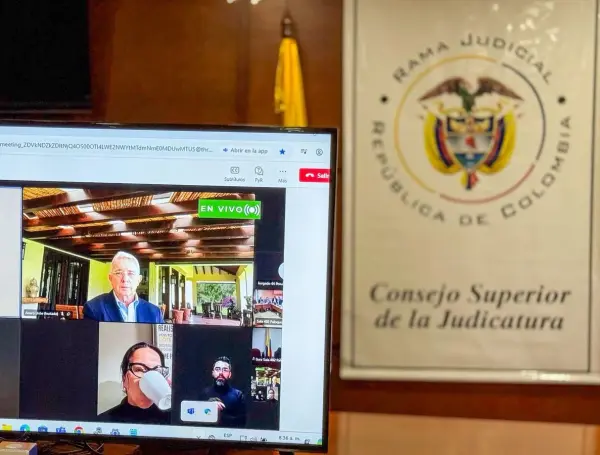
The defense had requested the exclusion of the material collected through these two channels, arguing"obvious irregularities" and violations of the accused's procedural guarantees, such as the violation of the principle of confidentiality between attorney and client, or the breaking of the chain of custody of the audios obtained in prison, which were handed over two years later.
The judge, following the line established at the time by the Court, when Uribe was still under its jurisdiction, dismissed these allegations. In the case of the erroneous wiretapping, she asserted that it represents an"unforeseen discovery" that has been endorsed by jurisprudence in Colombia and around the world.
‘Tapped by mistake’
In 2018, the Supreme Court of Justice ordered the interception, through the judicial police, of the telephone line of former Chocó representative Nilton Córdoba Manyoma in an investigation into"parapolitics." Against all odds, the phone that was tapped was Álvaro Uribe's, supposedly because the number appeared in Córdoba's file.
This occurred at a time when Uribe was engaged in open confrontations with members of the Court, such as former Justice José Luis Barceló. According to the Court, when it became clear that the voice on the phone was not Córdoba's, but that of Álvaro Uribe, the wiretap was ordered suspended. The wiretapping lasted 15 days, from March 12 to 27, recording Uribe's conversations with family members, politicians, and, primarily, with his lawyer Diego Cadena.
Judge Barceló, then president of the Supreme Court, asserted that"everything done in that case complied with the law," as the highest court of ordinary justice "does not intervene illegally." The period in which Uribe was intercepted is key to the investigation opened by the Court that same year into the case in which he was recently convicted and which was transferred to the Prosecutor's Office in 2020, when the then senator resigned his seat alleging"lack of guarantees" in the high court.
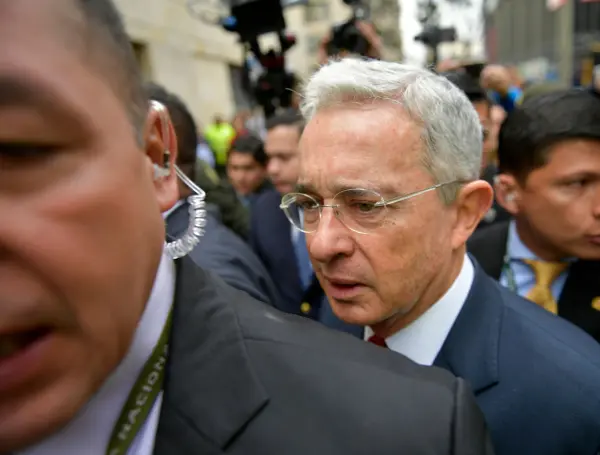
Although she asserted that she unintentionally eavesdropped on Uribe, the Court decided to use part of those recordings as evidence against the former president, based on the"subsequent evidence" argument. Despite the fact that attorney Jaime Granados, head of the defense, argued"a violation of procedural guarantees that protect the right to personal and family privacy" and noted that Law 906 of 2004 requires that "the interception of private communications requires a duly reasoned court order, which was not included in the case file," the judge sided with the Prosecutor's Office's argument.
“The inclusion of Álvaro Uribe’s cell phone as a target of the interception work was indeed the result of an involuntary error, derived from the information recorded in multiple documents from one of Nilton Córdoba’s cases, because they show a contact that was not appropriate,” he said during the hearing for the reading of the ruling, endorsing the recordings on which he based a good part of his decision.
She also dismissed another key point stemming from the"wiretapping incident": one of the pieces of evidence considered decisive by the judge is a conversation between Uribe and Cadena in which the former says,"Proceed, doctor."
Beyond the debate over whether that statement alone is enough to conclude that it was an alleged order to bribe witnesses (Uribe also says that the conversation occurred six months after Cadena's meeting with Monsalve at La Picota), it is a communication between a lawyer and his client, the inviolability of which is enshrined in law throughout the world. The judge says that, since there was no written power of attorney in favor of Cadena, Uribe could not be considered his client and that, therefore, the communication could be spied on.
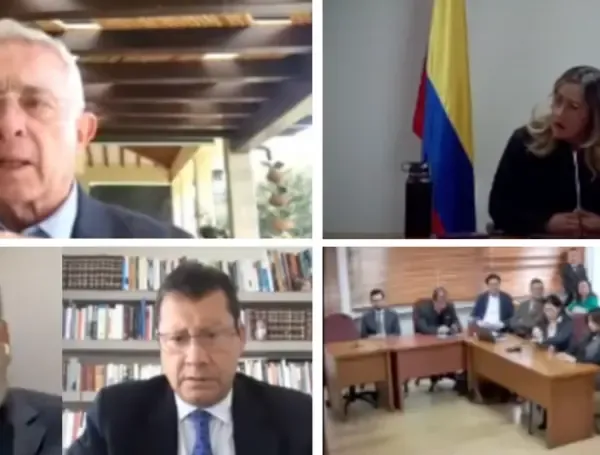
"In the present case, the exclusion of the interceptions is not appropriate, even assuming that there was an attorney-client relationship between the interlocutors, since the communications demonstrate the possible planning of criminal conduct," he said.
Again, this argument is refuted from several legal angles. Former prosecutor Jaime Bernal Cuéllar warns that"whether by mistake or whatever, even if there was no deliberate intent, I believe that the evidence cannot be used; it violates people's privacy and was not authorized by any judge. In this case, I think it could have been a mistake, but the fact that it was that way cannot be allowed. It must be dismissed."
Former minister and lawyer Luis Felipe Henao agrees with this position. “The judge acknowledged that the interception was made in error, which demonstrates that there was no formal request before a judge of guarantees. The target of the surveillance was not Álvaro Uribe, but a third party, which meant that, once the error was discovered, it should have been immediately suspended, and that didn't happen. This interception ended up being the only evidence directly linking Uribe to Cadena's administration.”
And he added: “We would have to burn all the books on procedural guarantees and evidentiary law, because fundamental guarantees – such as the inviolability of private communications and even less so that of a lawyer with his client – cannot be violated in an attempt to prove a fact.”
Attorney Rodrigo Parada warns that the case could end up in international courts, given the unusual conditions under which this content was obtained and the court's decision, so far, to use it.
The spy watch
Another controversial piece of evidence is the recording Monsalve made of the conversation with Cadena using a spy watch. According to the court ruling, Monsalve felt he was being framed to change his testimony and that his own words alone wouldn't be enough to prove it. He then decided to record the offers.
The law allows a person to record, without the other person's permission, to capture the moment a crime is committed. In October of last year, the defense alleged that these recordings had been manipulated and that at least seven minutes of the original tape had been"mutilated." Furthermore, they argued that the chain of custody had been violated, since the records were handed over a couple of years after they were captured. The judge rejected these arguments.
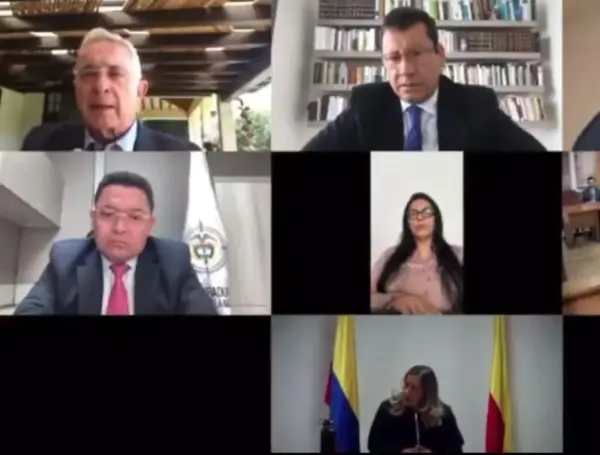
This controversy revived the Supreme Court's May 2011 decision, which declared illegal the information obtained from the computers of"Raúl Reyes," who was killed on March 1, 2008, and which proved crucial in the military defeat of the FARC.
In Order 29877, the Court rejected these emails as evidence in the"farcpolítica" case involving former Senator Piedad Córdoba, arguing a violation of the chain of custody, even though Interpol had guaranteed that the files had not been tampered with. The Court, at the time, set jurisprudence on procedural guarantees, stating that"although the State has a great interest in punishing crimes, their investigation cannot be carried out at any price, because the end does not justify the use of means that imply the denial of the rule of law itself."
Along these same lines of jurisprudence, former Attorney General Néstor Humberto Martínez told this newspaper that, in the Uribe case,"there is a double standard that cannot be sustained in the eyes of the court. The evidence is based on technical evidence whose integrity is seriously questionable, either due to flaws in the chain of custody or inconsistencies in its content, which means there is insufficient evidence for a court ruling."
The political earthquake
Less than 10 months before the presidential elections, Álvaro Uribe, the natural leader of the Democratic Center, will have to retreat, at least temporarily, to his winter quarters. This doesn't mean he's stepping back from politics, as he made clear on Friday.
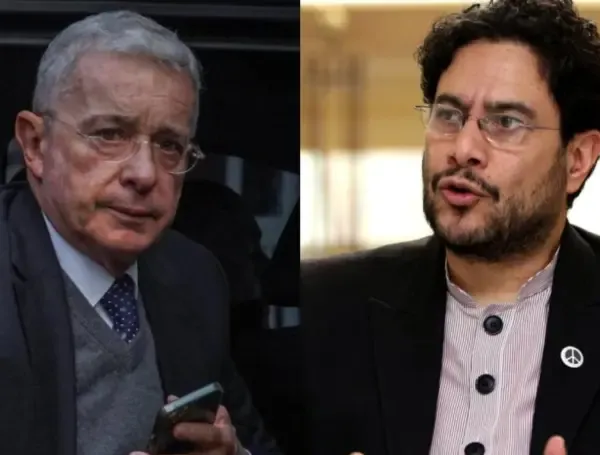
In recent days, the possibility of including Uribe on the 2026 ballot had been raised, either as a vice-presidential candidate or as the top candidate for the Senate. The conviction indirectly erased that possibility.
There is also the political cost for Uribe supporters, as explained by this newspaper's columnist and analyst Gabriel Cifuentes. The decision"will force the Democratic Center to expend political capital to defend Uribe," he said.
On the other hand, it's no small matter that this episode is occurring in the midst of the electoral contest and three months before the Historic Pact referendum, in which the presidential candidate will be chosen. For now, Gustavo Bolívar, María José Pizarro, Carolina Corcho, and Susana Muhamad are firmly in the running. But in Petrista circles, there is talk that if Uribe Vélez is found guilty, Cepeda, as a strengthened figure on the left, could enter the referendum to become the Pact's candidate.
And Cepeda, several Petrista voices told this newspaper, could unite the entire left, which is currently fragmented and lacks a strong figure to take up Gustavo Petro's banner. This sector is also facing a dilemma over whether to allow Daniel Quintero to attend their consultation, something they see as a risk in terms of representation in March. Therefore, they believe Cepeda could be the symbol that can counterbalance the former mayor in the electoral process they will organize in October.
The center will benefit the least politically. Most of its leaders' comments—with the exception of Claudia López, Uribe's political rival—have been neutral and limited to calling for fair trials and respect for judicial rulings. It remains to be seen whether that stance will serve them well in this scenario.

